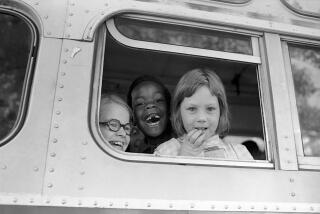Worried about a gray zone
- Share via
ALBANY, GA. — Every freshman who enrolls at Albany State University knows the saga of this small, proud school.
In a mandatory class, they learn how Joseph Winthrop Holley, a son of slaves, built the campus in 1903 to educate his fellow African Americans here along the banks of the Flint River. They learn how the historically black school survived the roiling race issues of the 20th century -- from Jim Crow to desegregation and beyond -- and how it survived the muddy Flint, which has flooded the campus time and again.
But today, there is talk of a new kind of deluge at this public school, one that many students fear would do even greater harm: The potential influx of white students from a nearby two-year college, who could go to Albany State under a proposal to merge the campuses that is floating around the Georgia Statehouse.
Bernard Postell, 25, an Albany State senior, worries that a merger with Darton College -- a school of 5,000 across town that is 53% white -- would dilute Albany State’s status as an HBCU, or Historically Black College and University.
He and many other students enrolled at this grassy southwest Georgia campus, he said, for the special experience of attending a majority-black school, with its step shows, its show band and its small but significant role in the civil rights struggle.
“It’s not that we don’t want to be with other races,” Postell said. “It’s that we don’t want to lose our culture that we’ve been building since 1903.”
The proposal was introduced this month by Seth Harp, chairman of the Georgia Senate’s Higher Education Committee. Georgia, like many states, is in the midst of a dramatic budget crisis, and Harp said the proposal would help close an estimated $2-billion shortfall.
Under the plan, Darton would be folded into Albany State, whose current undergraduate enrollment of 3,800 is 92% black. Harp proposes a similar plan for historically black Savannah State University and a nearby majority-white college, Armstrong Atlantic State University.
Harp, a white Republican from the Columbus, Ga., area, said his plan was about more than saving money -- it was also about tearing down what he called “the old vestiges of segregation”: Darton College, he noted, was founded during the mid-1960s as a haven for white students. In 1966, the school’s first year of operation, all of the 620 students enrolled at Darton were white, according to school records.
“We’ve got to heal one another and put this chapter behind us,” Harp said. “I’m not advocating erasing history, but what I am advocating is moving into the 21st century.”
Harp has not given many details of how the mergers would work, or save the state money. The proposal would have to be approved by the university system’s Board of Regents. Though the board currently has no plans to consider Harp’s proposal, the senator said he hoped to pressure it to do so.
Even so, the idea has become the topic of intense concern among proponents of historically black colleges.
Leonard L. Haynes III, executive director of the White House Initiative on Historically Black Colleges and Universities, said similar mergers had been proposed in Georgia and other states in decades past.
He called the current proposal “crazy,” and argued that black colleges meet special needs of black students that are inextricable from the broader African American experience.
“We can’t run away from our history,” he said. “We have to run with it. And running with our history means acknowledging the institutions that brought us to this point that are integral to our fabric -- the black church and the black college. They’re a foundation of our community.”
Haynes’ program, which was founded by President Carter, serves as the federal advocate for the nation’s 105 HBCUs, which last year received $380 million in special federal funding. They are defined as schools that were founded before 1964, with the express purpose of educating black students -- although open to all.
In fact, a number of schools considered “historically black,” such as Kentucky State University and Lincoln University of Missouri, serve large white populations and continue to receive special funding.
Many of the black students who oppose the plans emphasized that they didn’t mind being around white students -- they just didn’t want the school to lose its special role. “It wouldn’t be uncomfortable for me,” said freshman Martez Carr, a business major. “But it wouldn’t be a black college.”
Carr, 18, attended a mixed-race high school in Detroit; he said attending a black college had been a relief from the pressure of being the only minority in the room. “I feel like I can let loose, lay back, not act like somebody I’m not,” he said.
Some on campus were worried that the school would have trouble recruiting students if Albany State ceased to be regarded as a “black” school. Its yearly rituals, like homecoming weekend, have become a cornerstone of black social life in southwest Georgia. Other students wondered whether the school’s black alumni would cease to feel such strong ties to their alma mater.
They spoke, too, about Albany State’s special place in the history of this rich-soiled swath of the South. Before the Civil War, this was cotton country; W.E.B. Du Bois called the area “the richest slave kingdom the modern world ever knew.”
But in the postwar years, as Du Bois noted in “The Souls of Black Folk,” the freed men of Albany lived in desperate conditions. It was Du Bois’ description of their lot, in fact, that inspired Holley to start Albany State.
Later, the school was involved in pushing for equal rights. In the early 1960s, students were at the center of an intense push to integrate the city of Albany that attracted the attention of the Rev. Martin Luther King Jr. And Albany State’s second president was fired by the state Board of Regents for organizing voter registration drives of black Georgians.
Everette J. Freeman, the current school president, refused to comment on the proposal when asked about it last week. Instead, he handed out the mass e-mail he recently sent to the school community. It mentioned the school’s original mission and laid out its race-neutral objective for the future: “to be the preeminent institution of higher learning in southwest Georgia.”
Freeman’s e-mail cited the school’s 50.2% graduation rate -- the third-highest in the university system -- and its rich history, particularly its perseverance.
Albany State, the e-mail read, has “always found a way to do things without sufficient resources.”
A few students opposed the plan because they wondered whether white students in the Deep South would sign up at a historically black school.
The question was put to white students across town at Darton. Compared with Albany State -- with its columned old buildings, moss-draped oaks and founder’s grave a few yards from the riverbank -- the two-year college’s campus feels prosaic and practical, with buildings flanked by a massive parking lot bustling with black and white commuter students.
Ryan Edmondson, 19, opposed the merge. He said he was proud to attend Darton and would hate to see it disappear. It had nothing to do with race, he said.
“To tell you the truth . . . everybody my age are really, really cool with each other,” he said.
He paused for a moment and offered an addendum:
“Now for some people it definitely would be an issue.”
--
More to Read
Sign up for Essential California
The most important California stories and recommendations in your inbox every morning.
You may occasionally receive promotional content from the Los Angeles Times.













